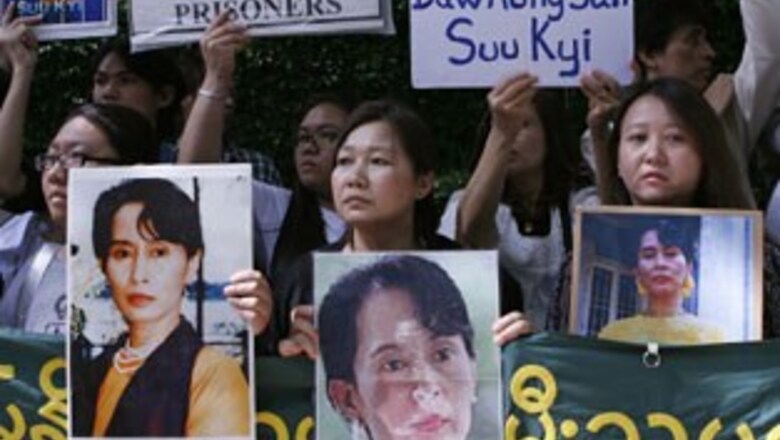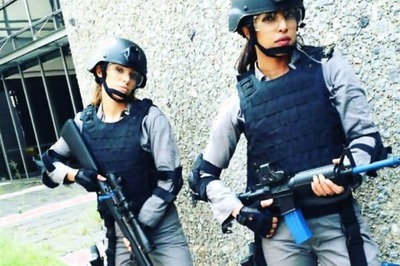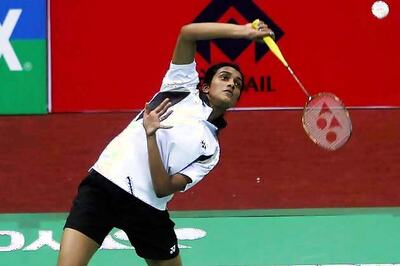
views
Yangon: Myanmar opposition leader Aung San Suu Kyi went on trial on Monday, facing a five-year jail sentence that has triggered threats of tougher international sanctions against the nation's military regime.
Suu Kyi, charged with breaking the terms of her house arrest after an American intruder sneaked into her home this month, was in good spirits as the closed-door trial began in the former Burma's notorious Insein prison, her lawyers said.
"She looked quite well. She said she was OK," Nyan Win, a lawyer and spokesman for Suu Kyi's National League for Democracy (NLD), told reporters.
John Yettaw, the 53-year-old American who used homemade flippers to swim to Suu Kyi's lakeside villa, attended a separate hearing on immigration and trespassing charges, state TV said.
Suu Kyi has denied the charges, which were reported for the first time on state-owned MRTV on Monday, five days after the Nobel laureate and two female companions were charged.
Security was tight outside the prison in Yangon. Armed police threw barbed wire barricades across roads and ordered businesses to close after dissidents called for mass protests against Suu Kyi's trial.
Some 200 NLD supporters and scores of pro-junta thugs gathered near the prison but there was no confrontation.
One NLD youth leader was briefly detained. The court heard from the first of 22 prosecution witnesses and adjourned until Tuesday.
Suu Kyi will not testify until the prosecution rests, Nyan Win said, adding the trial could last three months.
"If things go according to the law, we surely will win this case," he said.
Trumped up charges
Activists outside the military-ruled country are less optimistic about Suu Kyi avoiding a guilty verdict, which would carry a three- to five-year jail sentence.
They say the charges were trumped up to keep Suu Kyi in detention after her current house arrest order expires on May 27, six years after her latest incarceration began.
A conviction would sideline the charismatic NLD leader through the junta's promised elections in 2010, derided by the West as a sham to entrench more than four decades of military rule.
"The trial is all about keeping any voices of dissent silent in the run-up to rigged elections next year," said Zoya Phan of the Burma Campaign UK, which planned demonstrations at Myanmar embassies in 20 cities around the world on Monday.
The military, which denied the NLD power in 1990 after its landslide election victory, has detained Suu Kyi for more than 13 of the past 19 years.
She has spent most of that time at her Yangon home guarded by police. Her phone line has been cut and visitors restricted.
Yettaw, described by state media as a psychology student from Missouri, is charged with immigration violations, encouraging others to break the law and entering a restricted area.
His motives are unclear. He swam to her home before, on November 30 last year, and left a copy of the Book of Mormon after she refused to see him, according to the police complaint.
When he tried again on the night of May 3, Suu Kyi gave him food and allowed him to stay until May 5, the complaint said.
Suu Kyi's lawyers say she did not invite Yettaw and pleaded with him to leave, but he refused.
Myanmar's generals have ignored calls for her release from Western governments, the United Nations, human rights groups and fellow Nobel laureates.
In Brussels, EU foreign policy chief Javier Solana said the group, which renewed sanctions against Myanmar in April, should consider tougher measures in protest at Suu Kyi's treatment.
"It's not the moment to lower sanctions, it's the moment in any case to increase them," he said ahead of a meeting of EU foreign ministers.
US President Barack Obama renewed sanctions against the regime on Friday, saying its actions and policies, including the jailing of more than 2,000 political prisoners, continued to pose a serious threat to US interests.
The reaction from Asian neighbours, which have an eye on Myanmar's rich timber, gas and mineral reserves, has been mixed.
China and India have been silent, but the Philippine government said it was "deeply troubled and outraged over the filing of trumped-up charges" against Suu Kyi and worried about her health in one of Asia's worst jails.
Asian governments have favoured a policy of engagement, but neither that nor the sanctions imposed by the West have coaxed meaningful reforms from junta leader Senior General Than Shwe, who is widely believed to loathe Suu Kyi.


















Comments
0 comment